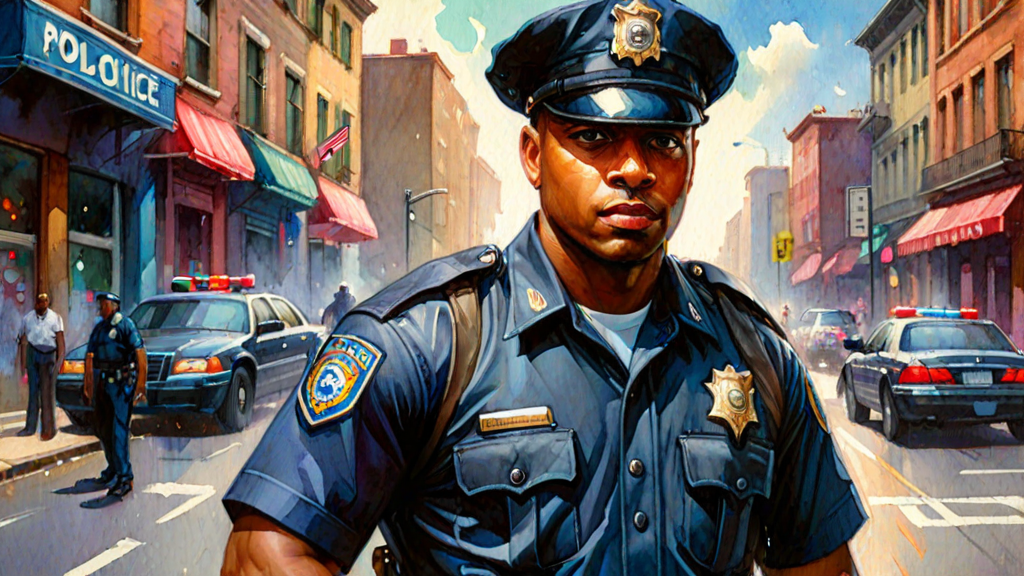
¡Hola, amigos! This post is specially designed for my intermediate Spanish students who want to improve their listening comprehension in challenging situations.
I have chosen an authentic audio clip in which a Dominican police officer shares his experiences and concerns. As you listen to the audio, imagine you are in the Dominican Republic and the officer is telling you personally, perhaps in a bar, everything he is going through. The audio contains a lot of background noise and the officer speaks very informally and regionally, which makes it an ideal tool for practicing listening in real-life contexts.
You don’t need to understand every detail, such as how many dollars a Dominican peso is worth: the most important thing is to grasp the overall context. This post includes a full transcript of the audio and a complete translation into English, so you can follow along and keep practicing.
Of course, we’ll continue to practise in class.
If you want, you can watch the full video here, uploaded on October 9, 2015: https://www.youtube.com/watch?v=_paPePoY9dI.
Good luck and enjoy the challenge!
IMPORTANTE: Este sitio web es exclusivamente para fines educativos y está dirigido sólo a mis estudiantes. Aunque mi sitio web está disponible en internet, el contenido es de uso privado para mis alumnos. No tengo la intención de infringir ningún derecho de autor y siempre proporciono enlaces a las publicaciones originales. Siempre adapto estas obras con un enfoque educativo, sin fines comerciales.
El hecho de que yo esté portando este uniforme no quiere decir que yo sea un usurpador. Yo soy un raso de la gloriosa Policía Nacional de la República Dominicana, pero entiendo que ya es hora de que alguien hable de las precariedades con las que tiene que lidiar un agente policial en nuestro país.
The fact that I am wearing this uniform does not mean that I am a usurper. I am a rank-and-file officer of the glorious National Police of the Dominican Republic, but I understand that it is time for someone to speak about the precarities an officer has to deal with in our country.
¿Cómo es posible que el policía tenga un sueldo cebolla? Un sueldo cebolla es que de sólo verlo te dan ganas de llorar. Un raso de la gloriosa Policía Nacional gana cinco mil ochocientos pesos y para el colmo, el banco se queda con quince, porque la cuenta no se puede quedar en cero.
How is it possible that the policeman should have an “onion” salary? An “onion” salary is one that, just by looking at it, makes you feel like crying. A rank-and-file member of the glorious National Police earns five thousand eight hundred pesos, and to make matters worse, the bank takes fifteen, because the account cannot be left at zero.
Vamos a hacerlo con este ejercicio breve: con cinco mil ochocientos pesos, yo pago tres mil de casa porque vivo solo. ¡Y vayan ustedes a ver dónde es que vivo! Pago seiscientos pesos del colegio para el niño. Mil cien para comprar una lata de leche que no le dura quince días y los otros mil cien es para pagarlo en el colmado: de papas, fideos y galletitas.
We are going to do it with this short exercise: with five thousand eight hundred pesos, I pay three thousand of house because I live alone. And go you (plural) to see where it is that I live! I pay six hundred pesos of the school for the child. One thousand one hundred to buy a can of milk that does not last fifteen days for him and the other one thousand one hundred is to pay it in the corner store: of potatoes, noodles and little cookies.
Después de que la policía fue creada, por el país han pasado dieciocho presidentes, incluyendo los testaferros que utilizó Trujillo, y ninguno se ha preocupado por aumentarle al policía, o hacer un aumento significativo que mejore la calidad de vida del policía. Señores, un policía arriesga su vida en un día por ciento noventa y tres pesos, a dieciséis pesos la hora, por dieciséis pesos sale un policía a arriesgar su vida a la calle.
After the police was created, through the country have passed eighteen presidents, including the front men that Trujillo used, and none has worried about increasing to the policeman, or making a significant raise that could improve the policeman’s quality of life. Gentlemen, a policeman risks his life in a day for one hundred ninety?three pesos, at sixteen pesos the hour; for sixteen pesos a policeman goes out to risk his life on the street.
¿Entonces, es que ustedes tienen el macuteo como un esquema de compensación del policía? El policía no tiene derecho a comer. El policía no tiene derecho a vestir ropa civil. Tiene que tener siempre su uniforme. El policía no tiene derecho a pagar un pasaje. Entonces el policía honesto que se lo lleve el diablo.
So are you saying that the illicit payoffs is the police’s compensation scheme? The police officer has no right to eat. The police officer has no right to wear civilian clothes. He must always have his uniform on. The police officer has no right to pay for a fare. So an honest police officer can go to hell.
Yo sé que por este video pueden aplicar una sanción de diez o quince días. ¿Y quién sabe si hasta me cancelan? Porque es que la policía fue creada por Trujillo en el año mil novecientos treinta y seis. Y si hay una institución donde Trujillo vive en cuerpo y alma, es la Policía Nacional. Vive en cada uno de sus departamentos. Vive en la mayoría de sus coroneles y generales, que creen que macaneándote y poniéndote en atención, y diciéndote: “Usted es una tayota, podrida”.
I know they could suspend me for ten or fifteen days because of this video. And who knows if they might even dismiss me? The police were created by Trujillo in 1936. And if there’s any institution where Trujillo lives in body and soul, it’s the National Police. He lives in each of its departments. He lives in most of its colonels and generals, who think that by harassing you, putting you at attention, and saying to you, “You’re a rotten coward,” they’re doing something.
“Sí, señor. Yo soy la tayota”. “Usted es un aguacate, inservible”. “Sí, señor. Yo soy un aguacate, inservible”. ¿Qué es eso?
“Yes, sir. I am the tayota.” “You are an aguacate, useless.” “Yes, sir. I am an aguacate, useless.” What is that?
La policía no se arregla con esa inmoralidad. La policía se puede arreglar si agilizan una reforma policial que está apresada en el Congreso Nacional.
The police cannot be fixed with that immorality. The police can be fixed if they push forward a police reform that’s stuck in the National Congress.
La policía se puede arreglar si de los seiscientos sesenta y tres mil quinientos cincuenta y ocho millones de pesos del presupuesto del dos mil dieciseis sacan una pequeñita porción para cambiarle el sueldo al policía nacional. Mientras eso suceda, seguiremos perdiendo jóvenes valiosos por culpa de la delincuencia. Fuera y dentro de la Policía Nacional.
The police can be fixed if, out of the 663,558,000,000 pesos in the 2016 budget, they take a small portion to raise the national police officer’s salary. Until that happens, we will keep losing valuable young people because of crime — both outside and inside the National Police.
¿Ustedes no se han puesto a pensar qué pasaría si un día los policías amanecen mal confesados y dicen: “Hoy no salgo para la calle porque exigimos un aumento salarial”? Como lo hacen los doctores, como lo hacen los profesores, los fiscales, las enfermeras.
Have you ever stopped to think what would happen if one day the police woke up in a bad mood and said, “I’m not going out on the streets today because we demand a pay raise”? Like doctors do, like teachers do, prosecutors, and nurses.
¿Ustedes no se han puesto a pensar qué pasaría? Las estadísticas del crimen aumentarían de manera drástica.
Have you ever stopped to think what would happen? Crime statistics would spike drastically.
Entonces, ahí se darán cuenta lo importante y lo necesario que es la policía nacional. ¡Mientras tanto, al policía honesto, que se lo lleve el diablo!
Then they’ll realize how important and necessary the National Police are. Meanwhile, let the honest police officer be damned!




